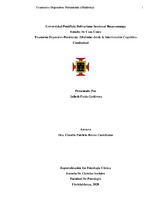Estudio De Caso Único Trastorno Depresivo Persistente (Distimia) desde la Intervención Cognitivo-Conductual

View/
Date
2020-05Author
Gutiérrez, Julieth Paola
xmlui.dri2xhtml.METS-1.0.item-advisor
Bueno Castellanos, Claudia Patricia
xmlui.dri2xhtml.METS-1.0.item-type
Especialización
Citación
Metadata
Show full item recordDocuments PDF
Abstract
En el presente trabajo de caso único se descnbirá el desarrollo y las principales características en la identificación del trastorno depresivo persistente (distimia) según el DSM-5 y la comorbilidad con el trastorno de ansiedad en un paciente de 23 años Se realizó el respectivo consentimiento informado, seguidamente la entrevista y la aplicación de pruebas de evaluación; la lista de eventos estresantes. entrevista neuropsiquiátrica (MINI) y la escala de estrategias COPING La intervención se realizó en 12 sesiones, se usaron técnicas cognitivo conductuales como, psicoeducación, modelado, reestructuración cognitiva (detección del pensamiento, distraibilidad, autoverbalizaciones. cuestionamiento y diálogo socrático, y la técnica de autocontrol). Seguidamente después de terminada la terapia el paciente presentó una disminución del episodio actual depresivo en el paciente. y mitigar estados de ansiedad mediante la técnica de relajación y la psicofarmacologia prescrita por el médico; pasado ese periodo se observa y el paciente refinó mejoría anímica, y personal. Caso único, Trastomo depresión persistente. Ansiedad, Técnica cognitivo-corduddes. In the present casestudy.I will describe the development and main characteristics in the identification of persistent depressive disorder (dysthymia) according to the DSM-5 and the comorbidity with the anxiety disorder in a patient 23 years. The respective informed consent was made, followed by the interview and the application of evaluation tests: the list of stressful events, neuropsychiatric interview (MINI) and the COPING strategy scale. The intervention was performed in 12 sessions, using cognitive behavioral techniques such as: psychoeducation. modeling, cognitive restructuring (detection of thought, distraction, self-verbalization, questioning and Socratic dialogue, and self-control). As for the results, it was possible to reduce the current depressive episode in the patient. and mitigate states of anxiety through the relaxation technique and the psychopharmacology prescribed by the doctor: after that period is observed and the patient reported mood improvement, and personal.
Keyword/s
Intervención psicológica
Terapia cognitiva
Terapia conductual
Ansiedad
Depresión mental
Collections
- Trabajos de grado [6468]
The following license files are associated with this item:

